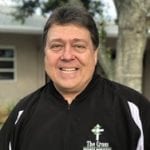
Before God called me into Life, I spent more than two decades training athletes and working as an exercise physiologist. A considerable portion of that time included studying and applying mental preparation strategies to help create peak performance states. That study included the area of self or “power” talk. Power talk includes “trigger phrases” such as “I can do it,” “Be the ball,” and “Focus, focus, focus.” It also uses mood words like “drive,” “explode” and “hustle.” When said with appropriate emphasis, these terms tend to generate a positive emotional and physiological response.
Examples of power talk
 If you spend any time watching professional baseball, for example, you’ll often see pitchers talking to themselves on the mound. You can bet the pitcher isn’t berating himself with words like, “Man, that was a lousy pitch!” Rather, he is employing trigger phrases like “Explode through the hitting zone!” or “Sharp break on the ball!”
If you spend any time watching professional baseball, for example, you’ll often see pitchers talking to themselves on the mound. You can bet the pitcher isn’t berating himself with words like, “Man, that was a lousy pitch!” Rather, he is employing trigger phrases like “Explode through the hitting zone!” or “Sharp break on the ball!”
After 14 years of walking with Jesus, I am a lot older and a little bit wiser. If I could do it all over again, I would tell everyone I worked with that there are two words that can take any individual from being ordinary to being extraordinary in every area of life. Those two words came from the lips of David in Psalm 12: “Help, Lord!”
David had internalized the key that unlocks the door leading to peak performance. The extent to which we grasp that key will determine whether we live out our calling in this world with any measure of success.
I want you to notice two things about this incredibly short but supernatural prayer that, when understood and applied, will make all the difference in your life.
The speaker is God-centered
David knew where to go in times of need. He was deeply distressed over how few remained faithful, and he cried out to God for help. David found himself in a place where the only way out was up, and he immediately and instinctively flew to his God in heaven. He did not use positive self-talk. He did not repeat mood words or mantras. He simply cried out to the only one who could help: God.
The speaker is God-dependent
In crying out to God, David acknowledged his own weakness and utter dependence upon the Lord. This does not mean that David was unwilling to do all that he could to help himself. The word “help” presupposes effort and exertion on our part, coupled with the confident expectation of help from above. It is simply not help if you are unwilling to do your part. But David knew he could do nothing without God’s helping hand.
I am sure you have heard the phrase, “If it’s to be, it’s up to me.” We live in a culture that teaches us self-reliance, the pull-yourself-up-by-your-own-bootstraps mentality. Benjamin Franklin penned the phrase “God helps those who help themselves” nearly three centuries ago, and today many believe these are the inspired words of Scripture, which they most emphatically are not.
Many Americans believe that a cry for help is the cry of the loser. One great American writer said, “A man who has to ask for help better not start off in the first place.” Such homilies reflect the so-called wisdom of a fallen, broken world, and it is absolutely antithetical to the teaching of the Bible.
David knew better. In his hour of darkness, he went to the only place he would find light enough to help him make it through. In Isaiah 41:13 we read, “For I am the Lord, your God, who takes hold of your right hand and says to you, Do not fear; I will help you.” Allow me to briefly unpack these great words of comfort.
“I am the Lord, your God.” Here we find God’s covenantal promise given to Abraham and his seed (Genesis 17:7). If you have placed your trust in Christ as Savior, the great Lord Jehovah has become your God, a personal God who has committed Himself in relationship to His people. He is an ever-present help in time of need (Psalm 46:1), not some distant deity who set the universe in motion and stepped back to watch it spin off in its own direction.
“Who takes hold of your right hand.” God is intimately personal. He takes hold of your right hand like a father takes the hand of his child before crossing the street. Notice the difference between a child who reaches up to take hold of a parent’s hand and a father reaching down to take hold of the child’s hand. The child is likely to become distracted for a variety of reasons and let go, but the father never will! How much more will God securely hold on to your hand. Our heavenly father has assured His children, “Never will I leave you; never will I forsake you” (Hebrews 13:5). When your hand is in His hand, there is nothing you can’t handle!
“Do not fear, I will help you.” The natural man fears even the sound of the rushing wind, but the child of God need not. Your intimately personal God not only commands you not to fear, He gives you the strength to overcome fear. When Omnipotence has made a commitment to help you, you have absolutely nothing to fear. Notice what this truth does not say: it does not say, “I will help you when you improve yourself” or “I will help you when you make things right with Me” or “I will help you when you’ve earned My favor.” God said, “I will help you.” Period!
It is your desperation that inclines God’s helpful heart, not your goodness. You simply cannot be good enough to broker God’s affection or help. Knowing that God will not turn away from your desperation should drive you to continually cry out, “Help me!”
The Christian songwriter Chris Rice penned a lovely contemporary hymn that contains these lyrics:
“Sometimes the way is lonely
And steep and filled with pain. So if your sky is dark and pours the rain, then …
Cry to Jesus
Cry to Jesus
Cry to Jesus and live!”
The truth of Scripture makes it clear that there should be no end to our cry for help to the One who has promised to help us.
– Tommy Boland regularly posts on his website: https://tommyboland.com/
For more articles by Dr. Tommy Boland, visit goodnewsfl.org/tommy-boland.

Comments